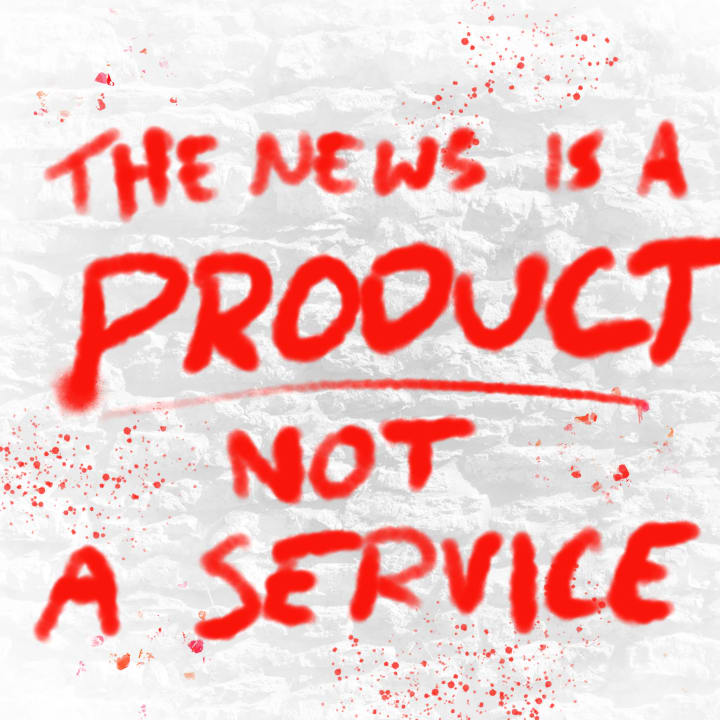Reclaiming Politics
The coronavirus has shone a light on disinformation - it is time for us to bring those forced to the extremes back into the fold.

Politics, as I see it, is the fabric from which society is weaved. It’s what sets out the rules of how we interact with one another, how we protect ourselves from threats, and even guides us on the kind of people that we want to be. It's the cornerstone of society, particularly in a democracy.
And yet, to so many, politics has become out-of-touch or irrelevant. More and more of us have been pushed to the fringes to find some form of identity, resulting in disinformation and extremism becoming increasingly prevalent in our national conversation.
But we’ve hit something of a crossroads. For the first time in the social media generation, we have endured our first crisis – a microscopic ball with spikes on it that has threatened the lives of everyone on the planet.
COVID-19.
For the first time in decades, government action has directly had an impact on every citizen's everyday life. The first rule of government is to protect your citizens, and the pandemic has posed a threat at an international, national, and individual level.
Here in the UK, initial government inaction led to our dinky little island having one of the world’s worst death rates. In the US, Trump’s presidency had the same effect. But now, through (belated) government action, we are all starting to see the light at the end of the tunnel – government-led vaccination programmes are our collective ticket back to normality.
Government action, politics, is the solution to a problem that has affected each and every one of us, even those of us pushed to the fringes. Governments that might have seemed aloof and misaligned are now the ones protecting us at an individual level.
The cracks in the veneer of conspiracy theories and disinformation are widening. This is our chance to use a global catastrophe to reshape the political landscape and make it work for all of us.

I am a colossal politics nerd. I studied it at university, I have worked for a political party, I work with think tanks and civil servants and I find politics endlessly fascinating. I admit that the systems in place for running a country are a little… obtuse. I understand that, for normal people, council meetings about potholes are about as much fun as food poisoning. But behind it all, behind the bureaucracy and regulations, is ideology.
That’s the fascinating bit, really. How a country is run both reflects the people within it and sets the boundaries for how those people live. In both the UK and the US, I’d argue that we are largely liberal, centre-right societies at our core – open and compassionate to those who come from different backgrounds and chasing the dream of working your way to a life of comfort.
Yes, we differ from region to region and no, we’re not perfect. But our values and our systems as democracies allow differing and dissenting voices from our own. This is a good thing – see our conformist, dictatorial rivals in the East for proof.
But we can start to see the problem here. A functional democracy works by allowing dissenting opinions the space to put their arguments forward. But, should they fail to persuade a majority to their beliefs, they are defeated. The dissenters acknowledge that they have lost, and concede defeat to popular opinion. At least, in theory.
What of those who are defeated? The father of contemporary liberalism, John Stuart Mill, philosophised at length about what he called "the tyranny of the majority": if 51% of a nation gets their way, 49% will be disappointed. We need only to look at last year’s US presidential election to see how pertinent that is – over 75m Americans voted for Trump, only for him to lose.
Having lost, then, does that mean that a Trump supporter’s vote is wasted? How does that make a functional member of a democratic country feel? Ignored. Isolated. Angry. Ready to turn to more extreme measures to make their voice heard.
A strong democracy, and a strong government, should be aware of this issue. Joe Biden’s rhetoric since taking the presidency has been centred on unity and healing – “A president for all Americans,” as he put it. Speaking directly to disappointed Trump supporters, he sought to try to welcome them into accepting a gracious defeat in a way that Trump systematically failed to do with his Democrat opponents.
But this is where we get to the crux of the matter. While the President of the United States is the most powerful man in the country (and, arguably, the world), his power is gifted to him by the people. That’s democracy in action – the people can remove him by voting, so the power ultimately lies with them.
And while Biden might have opened the door to Trump supporters, there is still extreme reluctance to walk through it. There is still division and anger among the power-givers, the people, and it doesn’t seem to be going away.
Why?
Disinformation.

There is no easy way to assess the impact that social media has had on the world. Put simply, it has given a voice to those who had none, and the ramifications of that are unimaginable.
Just think about what has been achieved through social media. The Arab Spring; the #MeToo movement following the Weinstein scandal; the #BLM protests around the world following the killing of George Floyd; Captain Sir Tom Moore raising £100m for the NHS in the UK.
Conversely, social media has been supremely damaging, too. The “sunlit uplands” of Brexit have so far consisted of rotting fish and freight delays. While he didn’t destroy the planet, as some predicted, Donald Trump’s presidency was controversial, to say the least. Social media had a direct hand to play in the storming of the Capitol building back in January, too.
Not only this, but social media has fundamentally changed the landscape of traditional media. News outlets have always had a slant, whether they be channels or print media. Fox News is unashamedly right-wing, MSNBC the opposite. In the UK, The Daily Mail and The Express fall to the right, while The Guardian veers strongly to the left.
Social media has taken one look at the traditional media landscape and set the whole thing on fire. Print media is dying, with traditionally-biased but factually-accurate newspapers handbrake-turning into more extreme, fringe stances in order to meet the demands of consumers who are becoming more radicalised by disinformation they read online (one-third of Americans regularly get their news from social media).
Outside of print media, Fox News frequently defers to dog-whistle commentary, even perpetuating mistruths like Biden “stealing” the election. The BBC has been accused by the Conservative government of being too “woke,” and a new Director General has been installed to make the broadcaster more “relevant” to the British people – i.e. more right-wing. Platforms are given across all channels to commentators and sensationalists who espouse extreme views, such as hard-left anti-Semites or anti-Islam campaigners.
It started with Facebook and Twitter. Platforms for everyone to have their say, without editorialising or fact-checking, and designed to perpetuate and polarise arguments to increase engagement. The irrepressible rise of the tech giants has made them more powerful than the rest of the media combined. Once-respected journalistic outlets have had to contort themselves into these extremist views in order to maintain their consumer base.
This leads to the fundamental point:

Newspapers and news outlets rely on customers to survive, and they are businesses. We all have our beliefs and our prejudices, and we actively seek out affirmation that we are right. It’s human nature to do so. But in so doing we perpetuate the division and chaos that the algorithms in Facebook and Twitter started in order to maximise their own profitability.
The fact is that social media has caused such a rapid societal change that politics hasn’t been able to keep up. But social media, especially at the extremist fringes, often builds beliefs on sand.
The pandemic has created a sinkhole.

While the wool hasn’t been fully pulled from our eyes, it’s fair to say that it’s slowly coming off, and taking a few eyelashes with it.
QAnon, the incessant conspiracy theory factory, seems to have hit a snag in its production line. The widely-shared excitement around the Inauguration Day arrest of Joe Biden and the grand revealing of the international paedophile cartel failed to materialise, much to no-one’s surprise except theirs.
Over in the UK, anti-vaxxers and lockdown sceptics are slowly but surely being silenced by the vaccination rollout’s roaring success – there were no deaths in London yesterday for the first time since the pandemic began. That the government’s plan seems to be working is sucking the oxygen out of the hyperbolic hysteria that shock-jocks like Julia Hartley-Brewer and Daniel Hannan spout on their platforms.
And Brexit. Oh, Brexit. I will never be too critical of the idea of Brexit in principle, so long as it was managed correctly. You can see an immediate benefit right now, in fact – the UK has vaccinated over 50% of our population (1st dose), compared to roughly 14% of the EU. But, in general, Brexit has been an unmitigated disaster. The Vote Leave campaign back in 2016 maximised the use of social media to sell the idea of a glorious, invincible Britain of the days of Empire. It was unashamedly jingoistic, right-wing, and nationalist.
Instead, what we have is a catastrophic fall in exports, multiple businesses going under or staring over the precipice, and outright hostility to our neighbours on the continent (and our biggest import and export partners). The promises of the Vote Leave campaign were hollow from the start, and now we have cracked the gold-painted Brexit eggshell to find… nothing.
The ever-turning wheel of disinformation is starting to wobble on its axle. The coronavirus has demonstrated the impact of government on everyone’s lives, and suddenly the disenfranchised and dismayed who felt abandoned by politics are starting, little by little, to see the consequences of believing opinions and not facts.

Now is our chance to reclaim politics. We have a real opportunity to take the democratic conversation away from the screaming-matches of the fringes and back to the debates of rationality. How do we do this?
Not by blood and thunder, however entertaining that might be. We achieve nothing by rubbing the noses of those swept up by conspiracy theories or disinformation in the dirt.
Instead, we welcome. We encourage those we disagree with to step out of their echo chambers kindly, compassionately, and start the process of challenging them by understanding them first.
Ask them to think about why the people they follow say the things they do. Tell them about who is on the Murdoch payroll, which of their favourite commentators rails against the elite while being a Harvard trust-fund kid, and who benefits by telling them to vote the way they do.
And, most importantly of all, no matter how insane they sound, we must show them respect. We must remember that these are people who are targeted for being vulnerable to lies – no matter how inexplicable their beliefs, it is not solely their fault. The reason they turned to the extremes in the first place is because that is where they felt welcome, so the onus is on us to help them feel safe and protected with us.
By doing this, we also bring them back into the political fold. Finding identity in society is the foundation of who we are as individuals, and a society that doesn’t listen leads to isolation and extremism. We cannot allow the tyranny of the majority to isolate vast swathes of our countrymen as we have before. And, as we welcome more back to the mainstream, we must elect politicians who listen to those with opposing views and engage with them rather than ostracise them.
As society becomes less confrontational, politics will too, but it can only start with us. With Biden in the White House, a message of unity is coming from the top. We, as the real power-holders in our democracies, must rise to the challenge of spreading it.
About the Creator
Matt Underhill
Politics geek / video game afficianado / occasional exerciser. Flag-bearer for reducing stigma around male mental health.
Part-dog.






Comments
There are no comments for this story
Be the first to respond and start the conversation.